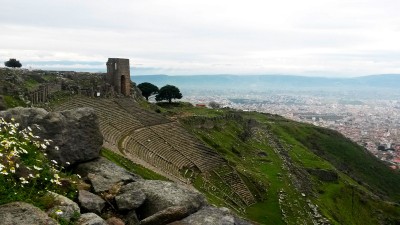
Due to safety concerns, Boston University has suspended its exchange programs with two universities in Turkey until further notice, study abroad administrators said.
Students from Bogaziçi University and Sabancı University can still attend classes at BU, but BU students can no longer exchange at these universities through the study abroad program, Executive Director of Study Abroad Gareth McFeely said.
These programs were suspended because BU can no longer guarantee the safety of students who would be enrolled at the two Istanbul universities, McFeely said. The political upheaval, terrorist threats and measures taken by the government against higher education have contributed to the university’s concerns, he said.
“There have been a series of terrorist bombings in Turkey over the last several years,” McFeely said. “But the number of particularly serious ones this year, including the one that targeted the main airport in Istanbul, and even more seriously, the alleged coup attempt, have made politics very unstable.”
BU also offered an exchange program with the American University of Beirut in Lebanon until it was suspended in 2013 for similar reasons, McFeely said.
Prior to this year’s suspension, the exchange program with Bogaziçi University brought BU students to the center of Istanbul, overlooking the Bosphorus Strait and close to the Black Sea, according to BU’s study abroad website.
The Sabancı University Exchange program gave students the opportunity to study at the premier private university in Turkey. The BU study abroad website stated their core philosophy of “learning to learn” attracted students to the variety of courses offered.
Eleanor King, a junior in the College of Communication, agreed that student’s safety should be the university’s priority.
“It’s kind of upsetting [to suspend the programs],” King said. “But it also makes sense because as a university they have to be super careful and have to attempt to protect their students from any issue that could happen.”
BU is not the only higher education institution that has recently suspended study abroad programs due to safety concerns. The University of California also suspended its Bogaziçi University exchange program for the 2016-17 academic year, citing “safety and security concerns.” Other universities, like the University of Wisconsin-Madison, chose to hire an international safety and security director to ensure students’ safety abroad.
McFeely said the university considered suspending its Paris and Brussels study abroad programs following terrorist attacks in the two cities last fall and this spring, respectively.
Eventually, the university decided to keep the programs in place because both countries are relatively politically stable, McFreely said.
“While there’s always some risk in any location, including here in Boston, we felt that the risks [in Paris or Brussels] were lower [than] the case in Istanbul, where the political environment, including the academic sector, was too unstable for us to, in good conscience, send students there,” McFeely said.
Maggi Mazri, a sophomore in the Sargent College of Health and Rehabilitation Sciences, said suspending the programs in Istanbul and Lebanon and not those in Paris doesn’t make sense.
“There are problems everywhere, so cancelling the programs because of bombings seems unfair,” Mazri said. “You could say the same thing about Paris. Why didn’t we stop sending kids there? There are problems everywhere you go, that’s not something you can avoid.”
In addition to safety concerns, the exchange programs in Istanbul and Beirut did not have the staffing support that other study abroad programs have, McFeely said.
“The support mechanisms are more limited in Istanbul, while in Paris and Brussels we have direct contact to our students on the ground on a daily basis,” McFeely said. “That’s simply not the case in either Istanbul or Beirut.”
Brennan Carney, a junior in COM, said she also understands the university’s decision.
“BU’s decision makes sense,” she said. “If it’s a case of students’ safety, and if they are not sure they can fully provide students with a safe place to stay and learn, [they should suspend the program.]”
It is unknown when the suspended BU programs will resume as normal, McFeely said; it will depend on the evolution of the political situations in Turkey and Lebanon.
“We do review semester by semester to see if it is appropriate to lift the suspension,” he said. “Our sense right now is that things in Istanbul and Turkey are pretty unstable and will continue to be unstable.”
























































































































Sheryl Hill • Sep 27, 2016 at 5:32 pm
Safety is not an accident. Any academic institute who is advantaged by federal tax dollars should defer to the US Department of State and avoid study abroad in countries with ‘warnings’ where the USDOS strongly advises you to consider not traveling there at all. In addition, specific locations within countries where USDOS issues warnings and has restrictions on employee travel should also be avoided, read the safety and security tab on the USDOS travel (dot) state (dot) gov website by specific country to determine dangerous ‘hot spots’ within countries. It is also a good idea to debrief with the most current Overseas Security Advisory Council Crime and Safety report for specific countries. Just do an Internet search, “OSAC 2016 Crime Report Costa Rica” for example. Travel safe. The only surprises should be good ones. Depart Smart has a free travel safety checklist on their .org website.